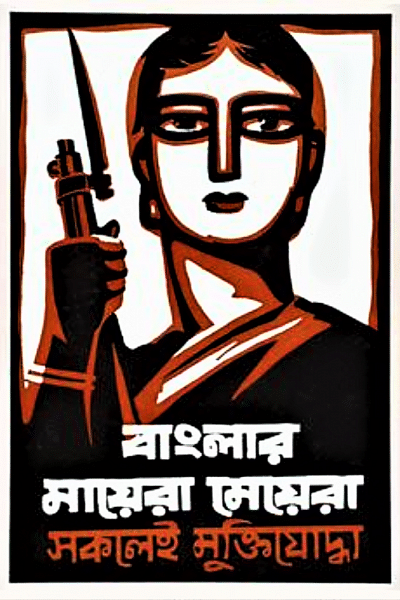Birangona, Fifty Years Later

Yesterday, we celebrated our 50th Victory Day. Yet, as the streets filled with black and white celebrations of 50 years since the birth of Bangladesh, many forgot to commemorate one of the most crucial people that gave us our independence -- the Birangona.
Yesterday, many did not know who the Birangona were. During the Liberation War, approximately 400,000 women were raped by the Pakistani army and their local collaborators. After the war had ended, despite being named war heroines by Bangabandhu Sheikh Mujibur Rahman, most were abandoned by their families and shunned by society.
Our history books have never taught us about the struggles of these women, nor did they teach us who they were; their fight during the war is one that society had anointed with shame instead of respect. They have become the forgotten part of the war.
When organised on such a mass scale, rape is a weapon of war. Tactics such as these are relatively common occurrences during war. Perhaps the most notable instance of this points to World War II when the Red Army raped about 2 million women. When people generally talk about those that fought for our country, the Birangona are left out of the conversation. After the war ended, the decision to name them war heroines was an attempt to integrate them back into society when they were abandoned by their families. Yet, half a century after the events, people still treat them and their stories with shame and disrespect, treating them like they are filth.
As we come together to fight against a larger epidemic of sexual violence in Bangladesh, we must remember to commemorate the women who played a part in liberating us. Until we are ready to acknowledge our past, our work in this cause will not be effective. Until we cannot admit that the Birangona are equally deserving of respect, our movement against rape will not be worthwhile.
Perhaps the biggest changes we can bring forward is to push to integrate these stories in our history books so that children grow up knowing the struggles behind the birth of our country and never disregard the stories of the Birangona. It is crucial that we have more conversations regarding them so that their stories can be properly commemorated and they are treated with the respect they deserve. This inherent idea of sexual violence tied with women's shame translates into our modern patriarchal society, and feeds into the notion that a woman's honour is lost when she is raped. Shame should never be on the oppressed, just the oppressor. When something traumatic happens to someone not even out of their own volition, it is never a matter of shame.
As we rejoice and celebrate this Victory Day and the ability to speak in our own language, it is crucial that we recognise the women who played a role in making this happen. The women who spent months locked inside rooms with 20 to 30 others, stripped naked, with no sense of privacy. The women who fought for our country every bit as much as a freedom fighter did so that we could live. Remember the women who gave you one of the most integral parts of your being: your country. Remember all the people who made this Victory Day possible, not just those that patriarchal society dictates you should remember.

 For all latest news, follow The Daily Star's Google News channel.
For all latest news, follow The Daily Star's Google News channel. 



Comments